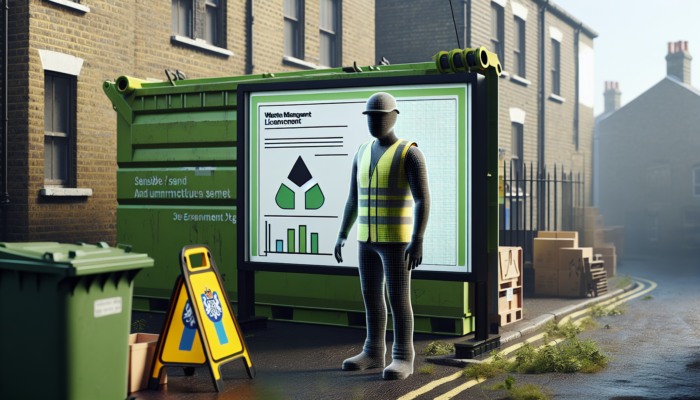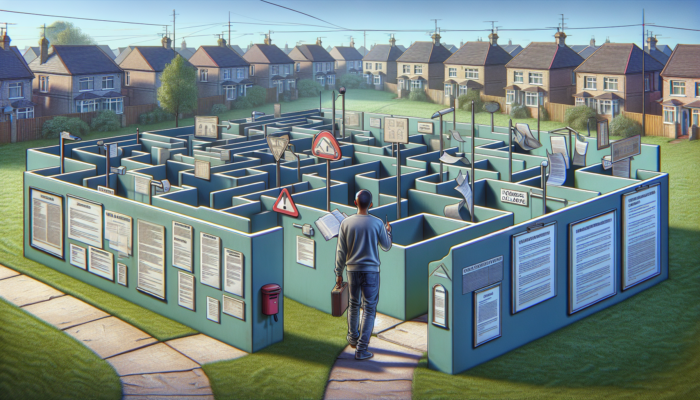Navigate UK House Clearance Regulations for Successful Property Cleanup
To effectively navigate the intricate landscape of house clearance regulations in the UK, one must possess a thorough understanding of the laws that govern waste disposal and property clearance. When undertaking the process of clearing a residence, it is imperative to be well-versed in which actions are legally acceptable and which are prohibited. The UK operates under a complex web of legislative frameworks related to various activities, and house clearance is no exception. By actively acquiring the necessary knowledge and resources, you can guarantee that your clearance operation is not only effective but also adheres to all legal requirements, ultimately protecting yourself from potential legal repercussions.
Understand the Importance of Waste Management Licences for Compliance

Engaging in house clearance is a multifaceted endeavor that entails much more than merely tossing items into a skip and moving on to the next task. In the UK, obtaining a waste management licence is often a requirement if you participate in any waste disposal activities. This requirement applies to both individuals and businesses involved in waste management. The Environment Agency (EA) stipulates that anyone involved in the collection, transportation, or disposal of waste must secure the appropriate licensing to legally conduct their operations.
It is essential to grasp the distinctions between a household waste licence and a commercial waste licence. While the licensing requirements may be less stringent for private homeowners clearing out their residences, professional clearance service providers or landlords must comply with more rigorous standards and regulations. Obtaining a licence necessitates demonstrating a comprehensive understanding of waste-handling practices, ensuring that you can safely manage various types of waste—from garden debris to bulky furniture.
Moreover, neglecting to secure the necessary licences can result in significant fines or legal complications. Therefore, prior to commencing your clearance project, it is advisable to consult with your local council to clarify the specific requirements applicable to your situation. In this context, knowledge serves as a crucial asset, acting as your foundational step towards achieving a successful and compliant house clearance.
Safely Manage Hazardous Materials During House Clearance Activities
What steps should you take when confronted with a canister of old paint or a collection of cleaning products that have long surpassed their expiration dates? This scenario brings hazardous materials into focus. The UK enforces stringent regulations regarding the handling and disposal of hazardous waste that you need to be aware of and comply with during your house clearance activities.
Hazardous materials can encompass a wide range of items, including asbestos, commonly found in older properties, as well as various chemicals and batteries. Each type of hazardous waste comes with specific disposal requirements; not every waste disposal facility will accept these types of materials. Thus, accurately identifying hazardous materials is of utmost importance. If uncertainty arises, consulting with a specialist can help shield you from potential dangers and avoid hefty fines.
Engaging a licensed waste disposal company to handle hazardous materials on your behalf is often the most prudent and compliant approach. This not only ensures adherence to legal requirements but also protects you from the health risks associated with improperly handling toxic substances.
Complying with Data Protection Laws During House Clearance Operations
In our increasingly digital landscape, where data breaches can result in significant consequences, adhering to UK data protection laws is vital during house clearance activities. When clearing homes, particularly those belonging to individuals who have passed away or transitioned to care, you may encounter personal documents that could contain bank statements, medical records, and other sensitive information.
Under the UK General Data Protection Regulation (GDPR), you hold a responsibility to protect any personal data you may come across during the clearance process. Mishandling or improperly disposing of such information can lead to serious legal ramifications. Shredding documents is the absolute minimum requirement; considering the use of secure shredding services for bulk disposal is advisable to ensure comprehensive compliance.
It is crucial to recognize that data protection is not merely a legal obligation but also a moral responsibility. By adhering to these regulations, you not only protect yourself from legal liabilities but also safeguard the privacy of the individuals whose information you are managing.
Local Council Regulations: Essential Insights for Effective House Clearance

When embarking on a house clearance project, it’s imperative to understand that national regulations do not solely dictate the process. Local councils throughout the UK impose specific requirements that you must effectively navigate. Familiarizing yourself with these council-specific regulations can dramatically influence whether your clearance proceeds smoothly or becomes bogged down by bureaucratic hurdles.
Obtaining Essential Permits and Notifications for House Clearance
What expectations do local councils have when you plan a house clearance? At the forefront of their expectations is the necessity to secure specific permits and notifications before initiating your clearance activities. Depending on your geographical location, you may be required to inform the council about your intended clearance, particularly if it involves significant waste removal or has the potential to disrupt local traffic patterns.
Neglecting to notify your local council could result in fines or penalties—an outcome that is certainly undesirable. The criteria for obtaining permits can vary widely; for instance, securing a permit is essential if you plan to use a skip that encroaches upon public land. Always take the initiative to check local regulations online or contact your council directly to ensure compliance.
Furthermore, it’s important to understand that local councils may impose distinct rules for residential properties compared to commercial entities. Grasping these distinctions is crucial to ensuring that your clearance progresses without complications or delays.
Comprehending Regulations Governing Waste Disposal Sites in Your Area
Not all waste disposal sites are created equal; each local council in the UK enforces regulations that govern their operations. Some sites may only accept certain types of waste or impose limits on the volume of waste that can be disposed of at any one time.
Moreover, many councils actively encourage recycling, making it essential to be aware of what can and cannot be recycled. Local recycling centres often have specific guidelines regarding the sorting and presentation of waste. Ignoring these rules creates unnecessary work for you and may lead to penalties or fines.
Conducting thorough research on the regulations governing your local disposal site can save you considerable hassle. Utilize council websites that frequently provide comprehensive guides to their waste disposal policies. Make it a habit to plan your disposal strategy with the same meticulous attention you would apply to any other significant undertaking.
Meeting Recycling Obligations During House Clearance Efforts

The UK is firmly committed to promoting environmental sustainability, with local councils leading the charge. Recycling obligations during house clearance are not optional; they are mandatory requirements that must be meticulously followed.
Most councils stipulate that a certain percentage of waste must be recycled, and failing to comply with these regulations could result in fines. As you sift through items during a house clearance, it’s vital to separate recyclable materials from general waste. This includes a wide variety of materials such as paper, plastics, metals, and glass.
Additionally, many councils provide specific recycling points and collection services, facilitating the correct disposal of recyclable materials. Embracing these recycling obligations not only ensures compliance but also contributes to a healthier planet for future generations.
Securing Waste Management Licenses for Compliance During House Clearance
As previously highlighted, obtaining waste management licenses is crucial for your house clearance activities. Local councils often have unique requirements that differ from national regulations. If you are a professional or business engaged in house clearance, acquiring a local waste management licence is often essential.
It’s vital to consult with your local council to understand the documentation required and the application process for acquiring the necessary licenses. Additionally, ensure that you renew any licenses in a timely manner, as operating without a valid license can lead to severe penalties.
Only individuals and entities holding the appropriate local council licenses can collect and dispose of waste within that area. Therefore, maintaining compliance is critical to avoiding complications later on.
Understanding Local Bylaws for Successful House Clearance
Navigating local bylaws can often feel daunting, yet understanding these regulations is crucial for a successful house clearance. Bylaws can dictate everything from waste management procedures to permissible noise levels during clearance activities.
For example, certain areas may restrict clearance operation hours to minimize disruption to local residents. Ignoring these bylaws can result in fines and negative repercussions from the community.
Consulting your local council’s bylaws before initiating any clearance project is vital. This proactive approach ensures legal compliance and fosters goodwill with your neighbours and the broader community.
Implementing Effective Strategies for a Smooth House Clearance Process
Time is an invaluable resource, particularly when it comes to house clearance. The more efficiently you can manage the process, the smoother your operation will be. Implementing effective strategies can significantly streamline your clearance, ensuring you meet all regulatory requirements while minimizing potential frustrations.
Developing a Comprehensive Sorting and Categorizing System for Efficiency
Before moving even a single item, it is crucial to devise a comprehensive sorting and categorizing strategy for your clearance. This approach goes beyond mere aesthetics; it is integral to enhancing efficiency and ensuring compliance. Start by designating specific areas for items you intend to keep, donate, recycle, or dispose of.
This systematic method simplifies the process and aids in fulfilling local recycling obligations. Items that can be reused or donated should be separated early in the process. Local charity shops and community centres often welcome donations, effectively reducing the volume of waste requiring disposal.
Consider using colour-coded bins or labels with clear indicators to enhance the visual organization of your clearance area. These visual cues help keep everyone focused and minimize confusion during what can be a hectic clearance process. Remember, the goal is to transform what could potentially be chaotic into a streamlined and orderly operation.
Identifying Safe and Legal Waste Disposal Methods for Compliance
Understanding the legal and safe methods for disposing of household items is paramount when it comes to waste management. Different materials necessitate different handling techniques, especially when hazardous materials such as electronics or chemicals are involved.
For instance, old electronics cannot simply be discarded in a skip; they must be taken to designated e-waste facilities that comply with the UK’s stringent disposal guidelines. Similarly, chemicals, paints, and oils often require specialized disposal processes to ensure they do not pose a threat to the environment.
Engaging a licensed waste disposal company can greatly simplify this process. These professionals are well-versed in the regulations and will ensure that your waste is disposed of safely and lawfully, thus protecting both you and the environment.
Maximizing Reuse and Donation Opportunities in Your House Clearance
In a society increasingly focused on waste reduction, maximizing opportunities for reuse and donation during house clearance is not just advisable but a collective responsibility. Many items that may seem worthless to you could hold significant value for someone else.
Before discarding any belongings, consider their potential for reuse. Furniture in good condition, fashionable clothing, and functional appliances could find new homes instead of ending up in a landfill. Local charities, community groups, and online platforms like Freecycle or Facebook Marketplace make it easier than ever to connect with new owners for unwanted items.
This practice not only helps reduce landfill waste but also fosters community spirit and supports those in need. It creates a win-win situation, transforming your clearance from a simple task into a meaningful act that generates positive ripples throughout your community.
Addressing Unique Challenges with Specialized Items During House Clearance
House clearances frequently present unique challenges, particularly when dealing with specialized items. Antiques, electronics, and possessions from hoarding situations require careful consideration and adherence to specific regulations.
Efficiently Managing Antiques and Valuable Collectibles
When confronted with antiques or valuable items during a clearance, it is wise to thoroughly assess their worth. Not all inherited or discovered items are simply rubbish; some could hold significant monetary value. Understanding the regulations surrounding the handling and sale of these items is essential.
If you suspect that an item may be valuable, it is advisable to consult an expert before proceeding with disposal. Auctions and antique shops are often eager to appraise items, potentially yielding financial rewards. However, it is also important to remain mindful of any regulations related to the sale of antiques, which may vary based on the type and age of the item.
Additionally, ensure that you maintain proper documentation for items of considerable value, especially if they are being transported. This precaution safeguards against loss or damage and ensures that your clearance process unfolds seamlessly.
Responsible Disposal of Electronic Waste for Environmental Safety
Electronic waste represents one of the fastest-growing waste streams globally, presenting specific challenges during house clearances. In the UK, strict regulations govern the disposal of electronic items such as televisions, computers, and mobile phones.
Simply discarding these items in general waste is not an option, as they contain hazardous materials that can harm the environment. Local councils typically have designated e-waste recycling facilities, and many retailers offer take-back schemes for old electronics.
Before clearing out electronic items, thoroughly investigate your options for responsible disposal. Engaging a specialist e-waste disposal service can streamline the process, ensuring compliance with all regulations while prioritizing environmental protection.
Handling Hoarding Situations with Compassion and Professionalism
Clearing homes affected by hoarding presents its own unique challenges and sensitivities. Hoarding disorder can lead to overwhelming situations, both emotionally and logistically. Understanding how to manage these scenarios is crucial for a successful clearance.
First and foremost, approach the situation with compassion. Engaging with the individual affected can help alleviate some of the stress associated with the clearance. You may need to dedicate time to categorize items and discuss what can be kept, donated, or disposed of.
Regulations and guidelines govern the clearance of such properties, particularly concerning refuse and hazardous materials. Consulting professionals who specialize in hoarding situations can provide invaluable support, ensuring compliance with local laws while remaining sensitive to the individual’s needs.
Understanding Legal Considerations and Required Documentation for House Clearance
As you delve deeper into the intricacies of house clearance, grasping the legal aspects involved becomes non-negotiable. Overlooking legalities can lead to complications that derail your clearance efforts.
Securing Property Rights and Required Permissions Prior to Clearance
Before loading items into a vehicle, ensure you have secured the necessary property rights and permissions. This is particularly critical if you are clearing a property that does not belong to you. Always consult with the property owner or their representative to avoid legal disputes.
In instances involving a deceased estate, ensure you have obtained the necessary permissions from the executor. Failing to secure these permissions can lead to disputes and complications later on, which can be time-consuming and costly.
Documenting these permissions is essential. Keep thorough records demonstrating that you have the right to clear the property, as this can prove invaluable should any issues arise during the clearance process.
Implementing Effective Record Keeping and Reporting Techniques
Meticulous record-keeping and reporting are not merely best practices in house clearance; they are crucial for compliance with UK regulatory requirements. Throughout the clearance process, diligently document what items are removed, their condition, and their disposal locations.
This serves as a safeguard for you and provides transparency should any questions arise regarding the disposal of items. Many councils require proof of waste disposal, and having accurate records can prevent potential fines or penalties.
Utilizing technology can streamline this process. Mobile applications that allow you to take photos and generate digital receipts can simplify record-keeping, making it easier to manage your documentation efficiently.
Understanding Insurance and Liability Considerations for House Clearance Activities
Comprehending the insurance and liability considerations is crucial for any house clearance operation. Accidents can occur during the clearance process, and being unprepared can expose you to significant legal risks.
Ensure that you have adequate insurance coverage for your activities during the clearance. This should include public liability insurance, which protects you from accidents involving third parties.
Furthermore, if you are hiring a clearance company, always verify that they possess sufficient insurance coverage. This not only safeguards your interests but also those of anyone who may be involved in the clearance process.
Aligning House Clearance Efforts with Environmental and Sustainability Goals
In today’s world, sustainability is not just a catchphrase but a critical consideration. As you engage in house clearance, understanding how to align your efforts with environmental and sustainability objectives is paramount.
Strategies to Minimize Landfill Waste During House Clearance
Landfills are reaching their capacity, and every item you can divert from them makes a significant difference. Implementing strategies to reduce landfill waste during clearance should be a top priority. This may involve separating recyclable materials, donating usable items, and engaging in responsible disposal practices that adhere to local regulations.
Many councils have initiatives aimed at reducing landfill waste, and utilizing these resources can simplify your efforts significantly. For instance, some councils provide collection services for bulky items or hazardous waste, streamlining the disposal process.
Educating yourself about local recycling facilities and their guidelines can also significantly reduce contributions to landfills. It’s not just about removing items; it’s about executing the clearance in a responsible and sustainable manner.
Contributing to a Circular Economy Through Thoughtful House Clearance
The concept of a circular economy is gaining traction globally, and your house clearance efforts can contribute to this movement. By reusing and recycling items instead of discarding them, you’re participating in a system that reduces waste and promotes sustainability.
Consider the entire lifecycle of the items you encounter during your clearance. Think creatively about how they can be repurposed or reused in everyday life. Local community groups often seek materials for their initiatives, allowing you to make a positive contribution while decluttering.
Research local businesses or charities that specialize in repurposing or upcycling items. By aligning your house clearance efforts with the principles of a circular economy, you not only fulfill your legal obligations but also contribute to building a more sustainable future for everyone.
Minimizing Your Carbon Footprint During the House Clearance Process
Every action has a carbon footprint, and house clearance is no exception. Understanding how to minimize your carbon footprint during the clearance process is crucial. This may involve using environmentally friendly transportation for moving items and ensuring responsible disposal methods are employed.
Opt for local disposal and recycling centres to reduce transportation emissions. If possible, hire local services for your clearance; this not only supports your community but also reduces the distance items must travel, thereby minimizing carbon output.
Furthermore, consider the materials used in the items you are clearing. Many products now come with environmental certifications, making it easier to select those that align with sustainability goals. Being mindful of your clearance process can significantly reduce your overall carbon footprint.
Utilizing Professional Services for a Stress-Free House Clearance Experience
Sometimes, the most effective approach to tackle a house clearance is by enlisting the help of professionals. Engaging with licensed services can alleviate stress and ensure compliance with regulations, streamlining your clearance process for optimal efficiency.
Choosing a Licensed House Clearance Company for Your Requirements
When it becomes necessary to seek professional assistance, it is crucial to select a licensed clearance company. Not every company operates within legal parameters, and the last thing you want is to find yourself entangled in legal complications due to another’s negligence.
Start by verifying their credentials—do they possess the required waste management licenses? Look for reviews and seek references to evaluate their reliability. A reputable company will be transparent about its practices and will gladly provide evidence of its compliance with regulations.
Furthermore, ensure that you clarify their pricing structure. Some companies may present an attractive initial quote only to impose hidden fees later. By conducting thorough research and making an informed choice, you can ensure a hassle-free clearance experience.
Consulting Legal and Regulatory Experts for Complex Clearance Projects
If your clearance project is particularly intricate, consider engaging a legal or regulatory consultant. These professionals possess extensive knowledge of the laws governing house clearance and can provide invaluable guidance on compliance, minimizing your risk of potential issues down the line.
Consultants can assist you in navigating local council requirements, identifying necessary permits, and ensuring that your clearance aligns with environmental guidelines. While their services may incur costs, the peace of mind they offer can be well worth the investment.
Additionally, having a consultant by your side can expedite the clearance process. Their expertise can eliminate bottlenecks and guarantee that every step is compliant, allowing you to focus on other pressing matters.
Leveraging Community and Volunteer Support for Effective Clearance
The value of community support should never be underestimated. Engaging volunteers or local community groups can make house clearance not only more manageable but also a more fulfilling endeavor.
Many community organizations are eager to assist, especially when the effort benefits those in need. Whether you are clearing a home for a charity or helping a neighbor in distress, these collective efforts can foster camaraderie and community engagement.
When working with volunteers, it is vital to communicate your needs clearly. Set expectations regarding safety and compliance with regulations, ensuring that everyone understands their role in the process. Ultimately, this collaborative effort can significantly enhance the efficiency and effectiveness of your clearance.
Engaging Professional Organizing Services for Enhanced Clearance Efficiency
If you find yourself overwhelmed by the sheer volume of items, hiring professional organizing services can greatly enhance the efficacy of the entire clearance process. These experts excel at sorting, categorizing, and optimizing space, enabling a smoother clearance experience.
Professional organizers can develop tailored systems that meet your needs, ensuring that items are sorted effectively and in compliance with local regulations. They can also assist in determining what should be retained, donated, or discarded.
While there may be a cost involved, their expertise and efficiency can significantly reduce the time and stress associated with house clearance, making their services a worthwhile investment.
Frequently Asked Questions About House Clearance Regulations
What are the key regulations for house clearance in the UK?
The key regulations involve obtaining waste management licenses, properly handling hazardous materials, and adhering to data protection laws when managing personal data.
Are permits required for house clearance operations?
Yes, securing a permit from your local council may be necessary in many instances, particularly if you are using a skip or impacting public land.
How should hazardous materials be managed during a clearance?
Hazardous materials must be disposed of at designated facilities that comply with UK regulations. If in doubt, consult professionals for guidance.
How can I maximize donations during a house clearance?
Carefully sort items and reach out to local charities or community groups that accept donations, ensuring that all items are in reusable condition.
What is the best approach to handling antiques during a clearance?
Have valuable antiques appraised by experts before disposal, as they may hold more value than you realize.
What type of insurance is necessary for house clearance activities?
Public liability insurance is crucial to protect yourself against accidents that may occur during the clearance process.
How can I reduce landfill waste during a house clearance?
Implement a sorting system for recycling, donate usable items, and utilize local recycling facilities to divert waste away from landfills.
What advantages come with hiring a professional clearance company?
A licensed company guarantees compliance with regulations, can safely manage all types of waste, and often has the experience to streamline the clearance process.
How do I ensure compliance with local council regulations during house clearance?
Research local council requirements online, contact them directly for clarification, and ensure that all necessary permits and notifications are obtained.
What is the concept of a circular economy, and how does it relate to house clearance?
A circular economy promotes reusing and recycling products rather than disposing of them. In-house clearance, it involves finding new homes for items instead of discarding them.
Connect with us on Facebook!
The Article: Understanding House Clearance Regulations: UK Edition Was First Found At https://birminghamhouseclearance.com
The Article House Clearance Regulations Explained: UK Guide Was Found On https://limitsofstrategy.com


Your exploration of house clearance regulations in the UK highlights a crucial yet often overlooked aspect of property management. It’s easy to underestimate the legal intricacies involved in what many perceive as merely a physical task of decluttering. However, the mention of waste management licenses opens up an essential dialogue about the broader implications of compliance and environmental responsibility.